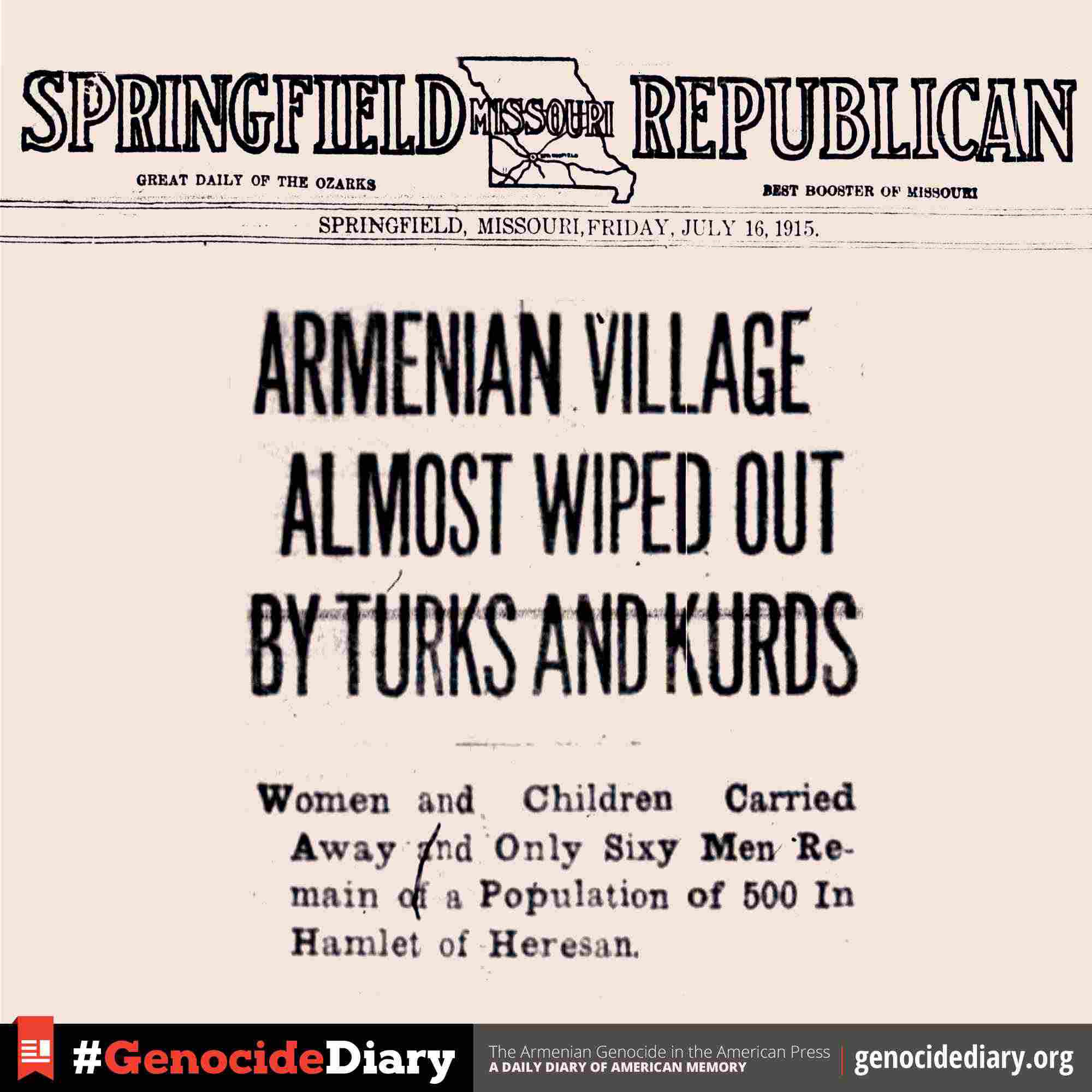Armenian Village Almost Wiped Out By Turks and Kurds
- DATE 16 Jul , 1915
- POSTED IN Missouri, United States
Women and Children Carried Away and Only Sixty Men Remain of a Population of 500 In Hamlet of Heresan
Several Wells Crammed With Bodies of Victims
Ravages Were Begun Last Fall By Chief Sherabeg and Many Were Killed and Thousands of Head of Cattle Confiscated
Russo-Armenian Camp. Near Bashkala. Kurdistan, June 20 (By Mail to the Associated Press)-For a perfect epitome of conditions in this region it is necessary to step only a few yards from Bashkala on the Chukh road to the hamlet of Heresan. There today the Associated Press correspondent found sixty Armenian men all that are known to remain alive and free in a population of 500 not a single woman or child but what had been killed or carried away by the Turks and Kurds.
Half a dozen wells were crammed with the bodies of those who had not been carried away. Sherabeg, a Kurdish chief, began the ravages last fall, killing a score of men and carrying off thousands of head of cattle. Some sixty of the sturdiest of the survivors fled to a monastery about fifteen miles away to procure arms and help but they could not recapture their village and had to flee for their lives, leaving the remaining population in the power of the Kurds. The latter camped at Heresan all winter and used the women and children as they chose. Immediately after the defeat of the Turkish troops under Hallil Bey, at Dilman, the Kurds foresaw their expulsion and made an end of such of the female and youthful population as they did not take away in slavery.
Bashkala Depopulated
In the Bashkala there is no one living now. But lately it was a flourishing and picturesque Asiatic city with many well-stocked stores and comfortable homes. Many of the houses were two-story structures of brick with tasteful balconies. There was an abundance of good rugs and some European furniture. The population comprised 1,500 Armenians, a few Jews and perhaps 3,000 Moslems. Of the Armenians, 500 women and children had been carried away and divided between the harems of Hassem Bey and Hashi Bey, Kurdish chiefs. The remainder had perished or fled. The Bashkala Moslems had also paid dearly, for their handsome city was looted, dismantled and burned. There were fires in a dozen places when the Associated Press correspondent visited the city today with a Russian general and his staff. The revenge on the Moslems had been worked in spite of the strict injunctions issued by both the Russian and Armenian leaders. The Armenian volunteers were particularly enraged because the Moslems, and, it is said the Jewish merchants also, betrayed the Armenians, who had been friendly to the Russians on their first advance on Bashkala last year.
It is characteristic of the bitterness between the two races that 25 Heresan recruits serving in the Turkish army were killed outright in the way of reprisal when news was received of the Turkish defeat at Dilman.
No Real Battles
The correspondent has been riding almost daily with General N…of the Russian army or Andranik, the Armenian leader, in pursuit of the illusive Turkish army under Hallil Bey. It was disclosed today that at least part of the Turkish forces were in a superb position on the slope of a high mountain flanked by some still higher. The Russian artillery succeeded in sending the forces to cover, but there was no general engagement. There has been warm cross-firing between outposts and on May 20 the Armenians succeeded in driving the Kurds from some of their mountain strongholds behind Bashkala and from the eastern side of the pass of Chukh. It yet remains to be seen whether the Turkish forces which were shelled today are of full strength.
One thing which impresses an American visitor in this region is the excellence of the grain fields of the upland plains. As good as they are in some places the country would gain enormously from the application of American irrigation methods and modern agricultural work. Whatever may be the issue of the war, it seems quite possible that this will come to pass for all Armenians look upon America as their school master.


